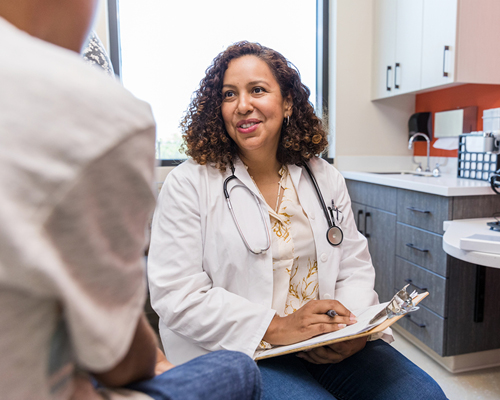Diabetes Care

Diabetes is a serious health condition that elevates blood sugar levels beyond healthy limits. It’s estimated that over 37 million Americans are diabetic—more than 11% of the population. Of those people, around 20% are undiagnosed and unaware they have the disease.1 Prediabetes is even more common. More than one in three Americans—around 96 million people—has prediabetes, and around 80% don’t know it.2 But with proper medical testing and healthy lifestyle choices, diabetes can often be managed or even prevented. The first step in prevention is understanding your risk. Take our free diabetes health risk assessment to learn more about your risk for diabetes.
What is Diabetes?
Normally when we eat something, our body releases insulin that allows our cells to absorb the sugar from our bloodstream. In a diabetic patient, the body doesn’t produce enough insulin, or doesn’t respond to insulin correctly. This causes blood sugar levels to rise, which can lead to many health issues, including heart disease, kidney disease, vision loss, or stroke.
What are the different types of diabetes?
Type I diabetes occurs when the body stops producing insulin entirely. It is usually diagnosed early in childhood, though it can sometimes manifest in adults. While the disease is genetic and lasts one’s whole life, patients can manage their blood sugar levels using diet, lifestyle changes, and insulin injections.
Type II diabetes arises later in life, and is caused by a mix of factors, including genetics, weight, age, and diet. It occurs when cells stop responding to the insulin the body produces, causing blood sugar levels to rise. Type II diabetes is very common, and accounts for more than 90% of diabetes cases in the United States.3 Once this disease develops, you must manage it for the rest of your life. The good news is that it can be prevented in most patients. Eating a balanced diet, engaging in regular physical activity and maintaining a healthy weight can help.
Gestational diabetes occurs only in females and results when pregnancy-related body changes affect the ability to make enough insulin. It typically goes away after birth but can increase the mother’s and the child’s risk for type 2 diabetes later in life.
Prediabetes is a related condition that precedes Type II diabetes. It occurs when blood sugar levels are elevated but aren’t yet high enough to qualify as diabetes. Prediabetes can be thought of as a “warning sign” – you may be at risk of developing diabetes, but there’s still time to change direction. With help from your doctor, you can adopt healthy lifestyle habits and avoid Type II diabetes entirely.
Do I have diabetes?
Certain symptoms can indicate diabetes or prediabetes. If you are experiencing unusual hunger or fatigue, blurry vision, tingling in the hands and feet, slow-healing sores, or increased urination (especially at night), you should talk to your provider immediately. However, diabetes and prediabetes often have no symptoms at all. This is why testing is so important.
What can I do to prevent diabetes?
The first step in preventing diabetes is knowing your risk. A simple blood sugar test can determine if you have diabetes or prediabetes, and your provider can help you understand your other risk factors, such as lifestyle and family history. With your provider’s assistance, you can form a plan of diet, exercise and medication (if needed) to keep your blood sugar at a healthy level.
Schedule a check-up with your provider and learn what you can do to stay healthy. To find a provider, visit our Find a Doctor tool or call 800.339.8758.
For more information on diabetes, visit www.cdc.gov/diabetes and www.diabetes.org.
References:
The Diabetes Care Center at Frye Regional Medical Center is dedicated to improving the education and care of individuals living with diabetes. Education is provided to adults and pediatric patients with Certified Diabetes Educators (CDEs) on staff.
For more information or to register for a class, call 828.322.6699.
Educational Opportunities
Frye Regional Medical Center's Diabetes Self-Management Care has been Recognized by the American Diabetes Association for Quality Diabetes Self-Management Education* and Support.
Services include:
- 1:1 Individual and follow-up sessions
- Comprehensive classes
- Individual assessment
- Gestational diabetes class
- Pre-diabetes education
A physician’s referral is required for all patients attending these classes and needed for insurance reimbursement. Patients should contact their insurance company concerning coverage and benefits available for diabetes self-management education.
Education Modules
Designed for those patients with no insurance or insurance with a high deductible that has not been met. These one-hour sessions are structured to meet the patient's individual educational needs. Education sessions are led by the Diabetes Program Coordinator.
Other Services
- Beginning insulin therapy
- Continuous Glucose Monitoring System (CGMS)
- Introduction to insulin pumps
- Insulin pump management and upgrades
- MNT (medical nutrition therapy)
- Support groups
Find a Doctor
Call 828.315.3391 or search our online directory.
Find Us
Frye Regional Diabetes Care Center
Located at Frye Regional Outpatient Imaging Center
1781 Tate Blvd SE
Hickory, NC 28602
Phone: 828.322.6699
Fax: 828.304.1234
Our Hours
Monday – Thursday
8:30 am – 5:00 pm
